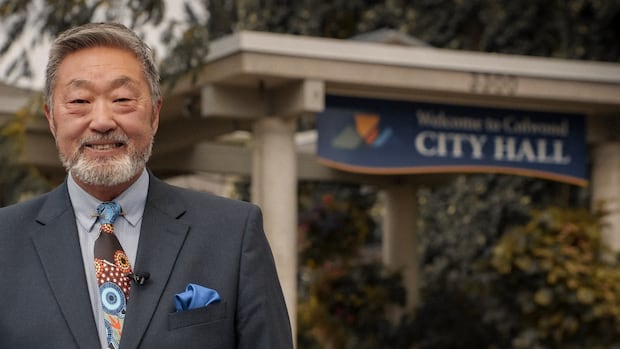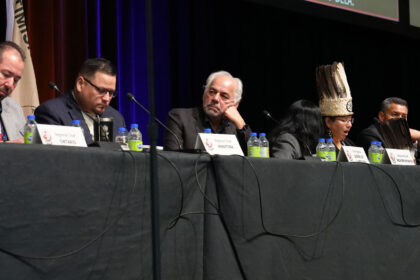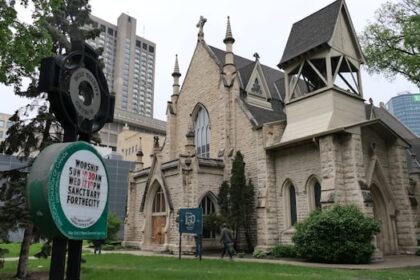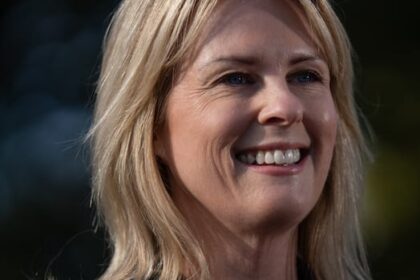When the mayor of Colwood, B.C., went for an appointment with his family doctor in 2022, he was in for a rude surprise. The doctor was moving away. “I was absolutely stunned,” Doug Kobayashi said.Kobayashi, who’s been mayor of the city near Victoria since 2022, could have waited for the B.C government to eventually step in with a plan to attract doctors. But he didn’t. Instead, he stepped up with a solution of his own that could create a blueprint for other communities across the country struggling to attract and retain family doctors.”Here’s the bottom line — making it as simple [for the doctor] as possible,” he said.Kobayashi’s idea was straightforward. After talking to doctors in 2022 about what was important to them, many said less paperwork, more financial stability and a better work/life balance.WATCH | Colwood residents talk about the mayor’s push for family doctors: Hear from Colwood, B.C., residents on the mayor’s push to bring in local family doctors The mayor of Colwood, B.C., is backing a plan to have family doctors become municipal employees, a move the community hopes will help them gain access to critical health care that has been missing from the area since 2002.Kobayashi’s response: Make them municipal employees. This differs from the usual system where many family doctors in Canada are independent contractors and responsible for all aspects of the business plus seeing patients. “As an employee, we want you to be a doctor 100 per cent of the time. No more administration, we’ll look after this. We’ll look after hiring your medical office assistants. We will give you a salary, a fixed salary. We will give you benefits, all the benefits,” Kobayashi said. “It’s like we manage our fire department and our RCMP detachment out here. It’s arm’s-length.” Colwood isn’t the only community across Canada trying to attract and retain family doctors. Many smaller cities try to tempt them with the promise of cheaper housing or affordable daycare.The city of Colwood covers costs — rent, overhead and staffing — for the health clinic. (Turgut Yeter/CBC)According to a 2024 survey by the Canadian Medical Association, more than one in five Canadians — or 6.5 million adults — don’t have a regular health-care provider.The latest Statistics Canada data from 2023 shows almost 83 per cent of adults have a family doctor — a drop from 85 per cent between 2017 and 2022. Quebecers fared the worst, with 75 per cent of adults having access to a regular health-care provider. Smaller rural communities often have more problems recruiting family doctors than their urban counterparts. According to a 2020 report from the Canadian Institute for Health Information, rural doctors made up eight per cent of the physicians in the country. But 53 per cent experienced burnout, often working in multiple communities. Kobayashi said he knew he had to act fast. Colwood, with its mountains and ocean-front views, was rapidly expanding, as people were moving into the area. Having access to family doctors would be a cornerstone of that attraction. He took his idea to his local member of the provincial legislature, who took it to the B.C. health minister at the time, Adrian Dix. Dix was intrigued. But Kobayashi said it was still unclear if it would work.”We don’t even know if this is a reality from a business case point of view,” Kobayashi recalled thinking at the time. “I’ve got to make sure I’m not breaking the Canada Health Act or the B.C. Medical Act.” And then there was the opposition he faced from provincial bureaucrats who warned how difficult it would be to make family doctors municipal employees.LISTEN | This doctor is ditching the U.S. for Vancouver Island: This is Vancouver IslandNew in town: This doctor is ditching the U.S. for the Island”I remember [hearing]: ‘There’s no way in hell’ — I think that was the word that was used — that you’re going to offer pensions and benefits to doctors. No way. It’s not going to happen,” he said. Still, Koyabashi, who describes himself as a “pitbull,” persevered. Once he and the province determined the clinic idea could be legal, it got the green light and the municipal council approved it. The Colwood clinic opened earlier this year.How it worksWhen a doctor sees a patient, the city bills the province, collects payment and pays the doctor’s salary. The city covers clinic costs — rent, overhead and staffing. Space from the pharmacy next door is leased, keeping costs down. Council allocated as much as $500,000 to set up the clinic, but Kobayashi says there will be no extra burden for taxpayers. “We believe it is sustainable. That’s one of the lessons we’re learning right now that with the proper scheduling, we’ve proven that it is a revenue cost-neutral project.” So far, one doctor is in place. Two more are expected to begin practising at the end of November, with the goal of having eight within five years. Dr. Cassandra Stiller was the first doctor to arrive with her family from London, Ont., where she was primarily practising sports medicine as part of a large multidisciplinary team. She saw first-hand in Colwood the impact of patients having no medical care available.WATCH | Watch The National’s report on Colwood:This bold idea could change how cities attract family doctorsWhen Colwood, B.C., lost its last family doctor, the mayor didn’t wait for help from the province. Instead, he came up with a bold idea that’s turning heads across Canada and could reshape how communities attract and retain doctors.”It’s been a bit of an emotional roller-coaster, as you feel for these people,” she said.”I’m seeing people who haven’t seen a doctor in 10 to 15 years and they’re presenting to me kind of for their first appointment. And we’re either diagnosing potentially a new diagnosis of high blood pressure or hypertension, discovering a new breast cancer.” The promise of the Colwood plan lured her west.”The idea or concept of the clinic was that the city would take over all the staffing, rent, coverage, those types of things. And I really just get to focus on the patient care aspect. And for me that was really something that intrigued me.” Stiller is part of a growing cohort of family doctors who don’t like the burden of running a practice. According to the Canadian Medical Association, less than one-third of medical school graduates chose to specialize in family medicine in 2023. That’s down from nearly two in five in 2014, with many doctors saying that balancing patient care plus the administrative burdens of running an office is too much.”We can see some trends,” said Steven Lewis, a health policy expert at Simon Fraser University in Burnaby, B.C., who’s looked at the issues important to medical school graduates. “There’s no longer a generation of physicians that want to be so tethered to their practice 24/7.” Stiller doesn’t mind not being her own boss. “I get a paycheque every two weeks, which is nice because then you can kind of have a bit of financial planning and stability in life.” Sheila Eldridge, left, and her husband, Shayne Eldridge, are patients of the Colwood Clinic. They had been waiting nearly three years for a family doctor before they got into the clinic. (Turgut Yeter/CBC)Sheila and Shayne Eldridge, 68 and 66, were among Stiller’s first patients. Originally from London, Ont., they came to Colwood in 2022 to be closer to family. They’d been waiting nearly three years to get a doctor. “It was like winning the lottery,” said Shayne Eldridge.”I started to cry. It was a very emotional experience for me to finally get the relief of having a physician to look after us,” said Sheila Eldridge. Will other communities follow suit?The Colwood Clinic is gaining interest from cities across the country. Kamloops, B.C., is looking to set up a municipally run clinic of its own and will present a proposal to council this fall. Other cities are intrigued, but unsure. Cost is an issue as well a question of jurisdiction. Health care is a provincial responsibility and some cities told CBC News they don’t want to step into that lane. One Ontario city that studied the Colwood plan carefully was Orillia, north of Toronto. It has a population of 34,000 people. According to its mayor, Don McIsaac, 12,000 of them are without a health-care provider. “I always like ideas that sort of break the mould and take a different look at things,” McIsaac said. Mayor Don McIsaac of Orillia, Ont., was interested in the health-care plan Colwood, B.C., is trying, but his council didn’t approve the budget to hire a doctor. (Turgut Yeter/CBC)However, costs to retrofit a space in city hall for a clinic would come close to $1.5 million. Council didn’t approve the expense, so instead the city will hire a physician recruiter. Still, McIsaac is leaving the door open for a Colwood-style clinic.”I think they nailed it,” he said. “We haven’t given up on that idea and we’re still looking for alternatives in terms of how to get there.” Despite the growing interest around the Colwood Clinic plan, some doctors’ groups are uncertain.Dr. Carrie Bernard, president of the College of Family Physicians of Canada, says the idea is an exciting one, but it comes with questions.”The risk is that if it’s just the community doing it on its own, would it be absolving the provinces in some ways from their responsibilities and would it enhance some inequities that already exist between communities at all sorts of levels?”Kobayashi says it’s not something every doctor will embrace. Some will continue to run their practices as entrepreneurs. But experts like Lewis agree that if the Colwood clinic plan spurs other cities to think outside the box, it can lead to solutions that can save people’s lives. “I think the lessons of the Colwoods of the world is if you build it they will come.”
‘I’m a problem solver’: Meet the mayor whose plan to attract family doctors is turning heads across Canada











